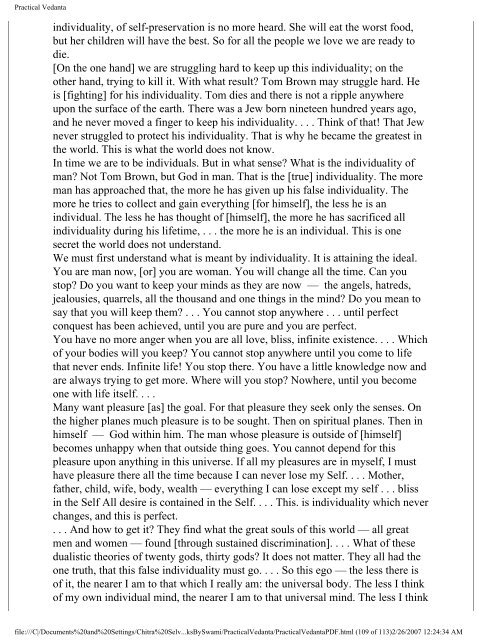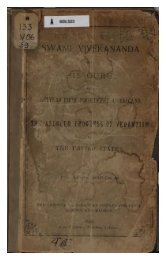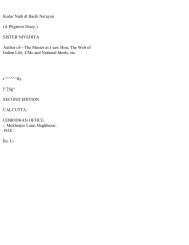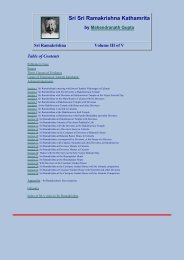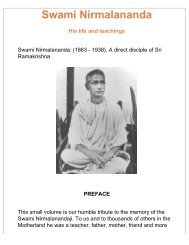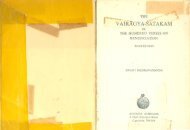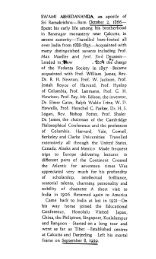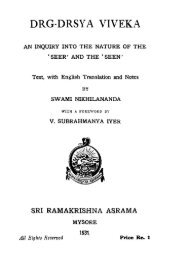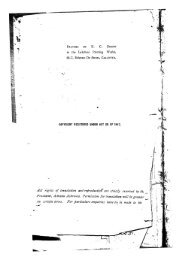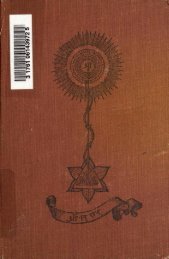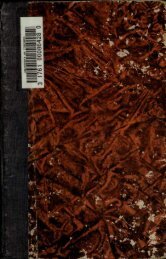<strong>Practical</strong> <strong>Vedanta</strong>race has infinite power, has [an] infinite body. The only question is what you are.Are you the race or one [individual]? The moment you isolate yourself, everythinghurts you. The moment you expand and feel for others, you gain help. The selfishman is the most miserable in the world. The happiest is the man who is not at allselfish. He has become the whole creation, the whole race and God [is] withinhim. . . . So in dualism — Christian, Hindu, and all religions — the code ofethics . . . . is: Do not be selfish . . . . things for others! Expand! . . . .The ignorant can be made to understand [this] very easily, and the learned can bemade to understand still more easily. But the man who has just got a speck oflearning, him God himself cannot make understand. [The truth is,] you are notseparate [from this universe]; Just as your Spirit] is [not] separate from the rest ofyou. If [not] so, you could not see anything, could not feel anything. Our bodiesare simply little whirlpools in the ocean of matter. Life is taking a turn and passingon, in another form . . . . The sun, the moon, the stars, you and I are merewhirlpools. Why did I select [a particular mind as mine? It is] simply a mentalwhirlpool in the ocean of mind.How else is it possible that my vibration reaches you just now? If you throw astone in the lake, it raises a vibration and [that stirs] the water into vibration. Ithrow my mind into the state of bliss and the tendency is to raise the same bliss inyour mind. How often in your mind or heart [you have thought something] andwithout [verbal] communication, [others have got your thought]? Everywhere weare one. . . . That is what we never understand. The whole [universe] is composedof time, space, and causation. And God [appears as this universe]. . . . When didnature begin? When you [forgot your true nature and] became [bound by time,space, and causation].This is the [rotating] circle of your bodies and yet that is your infinite nature. . . .That is certainly nature — time, space, and causation. That is all that is meant bynature. Time began when you began to think. Space began when you got the body;otherwise there cannot be any space. Causation began when you became limited.We have to have some sort of answer. There is the answer. [Our limitation] isplay. Just for the fun of it. Nothing binds you; nothing forces [you. You were]never bound. We are all acting our parts in this [play] of our own invention.But let us bring another question about individuality. Some people are so afraid oflosing their individuality. Wouldn't it be better for the pig to lose his pigindividualityif he can become God? Yes. But the poor pig does not think so at thetime. Which state is my individuality? When I was a baby sprawling on the floortrying to swallow my thumb? Was that the individuality I should be sorry to lose?Fifty years hence I shall look upon this present state and laugh, just as I [now]look upon the baby state. Which of these individualities shall I keep ? . . .We are to understand what is meant by this individuality. . . . [There are twoopposite tendencies:] one is the protection of the individuality, the other is theintense desire to sacrifice the individuality. . . . The mother sacrifices all her ownwill for the needy baby. . . . When she carries the baby in her arms, the call offile:///C|/Documents%20and%20Settings/Chitra%20Selv...ksBySwami/<strong>Practical</strong><strong>Vedanta</strong>/<strong>Practical</strong><strong>Vedanta</strong>PDF.html (108 of 113)2/26/2007 12:24:34 AM
<strong>Practical</strong> <strong>Vedanta</strong>individuality, of self-preservation is no more heard. She will eat the worst food,but her children will have the best. So for all the people we love we are ready todie.[On the one hand] we are struggling hard to keep up this individuality; on theother hand, trying to kill it. With what result? Tom Brown may struggle hard. Heis [fighting] for his individuality. Tom dies and there is not a ripple anywhereupon the surface of the earth. There was a Jew born nineteen hundred years ago,and he never moved a finger to keep his individuality. . . . Think of that! That Jewnever struggled to protect his individuality. That is why he became the greatest inthe world. This is what the world does not know.In time we are to be individuals. But in what sense? What is the individuality ofman? Not Tom Brown, but God in man. That is the [true] individuality. The moreman has approached that, the more he has given up his false individuality. Themore he tries to collect and gain everything [for himself], the less he is anindividual. The less he has thought of [himself], the more he has sacrificed allindividuality during his lifetime, . . . the more he is an individual. This is onesecret the world does not understand.We must first understand what is meant by individuality. It is attaining the ideal.You are man now, [or] you are woman. You will change all the time. Can youstop? Do you want to keep your minds as they are now — the angels, hatreds,jealousies, quarrels, all the thousand and one things in the mind? Do you mean tosay that you will keep them? . . . You cannot stop anywhere . . . until perfectconquest has been achieved, until you are pure and you are perfect.You have no more anger when you are all love, bliss, infinite existence. . . . Whichof your bodies will you keep? You cannot stop anywhere until you come to lifethat never ends. Infinite life! You stop there. You have a little knowledge now andare always trying to get more. Where will you stop? Nowhere, until you becomeone with life itself. . . .Many want pleasure [as] the goal. For that pleasure they seek only the senses. Onthe higher planes much pleasure is to be sought. Then on spiritual planes. Then inhimself — God within him. The man whose pleasure is outside of [himself]becomes unhappy when that outside thing goes. You cannot depend for thispleasure upon anything in this universe. If all my pleasures are in myself, I musthave pleasure there all the time because I can never lose my Self. . . . Mother,father, child, wife, body, wealth — everything I can lose except my self . . . blissin the Self All desire is contained in the Self. . . . This. is individuality which neverchanges, and this is perfect.. . . And how to get it? They find what the great souls of this world — all greatmen and women — found [through sustained discrimination]. . . . What of thesedualistic theories of twenty gods, thirty gods? It does not matter. They all had theone truth, that this false individuality must go. . . . So this ego — the less there isof it, the nearer I am to that which I really am: the universal body. The less I thinkof my own individual mind, the nearer I am to that universal mind. The less I thinkfile:///C|/Documents%20and%20Settings/Chitra%20Selv...ksBySwami/<strong>Practical</strong><strong>Vedanta</strong>/<strong>Practical</strong><strong>Vedanta</strong>PDF.html (109 of 113)2/26/2007 12:24:34 AM
- Page 1 and 2:
Practical VedantaPractical VedantaP
- Page 3 and 4:
Practical Vedantaworld. If I am a s
- Page 5 and 6:
Practical Vedantadifference is only
- Page 7 and 8:
Practical VedantaThe ideal of faith
- Page 9 and 10:
Practical Vedantamoment of our live
- Page 11 and 12:
Practical Vedantaof the Christs and
- Page 13 and 14:
Practical Vedanta"This life is Brah
- Page 15 and 16:
Practical Vedantadark fifteen days,
- Page 17 and 18:
Practical Vedantalife. This is the
- Page 19 and 20:
Practical Vedantaeverything would b
- Page 21 and 22:
Practical Vedantait is only through
- Page 23 and 24:
Practical Vedantawhich is that subt
- Page 25 and 26:
Practical Vedantanoumenon and pheno
- Page 27 and 28:
Practical Vedantato which is the be
- Page 29 and 30:
Practical VedantaAbsolute.The finit
- Page 31 and 32:
Practical Vedantawhich is not the q
- Page 33 and 34:
Practical Vedantaexperience that th
- Page 35 and 36:
Practical Vedantafulfilled. The Jiv
- Page 37 and 38:
Practical Vedantabetween the pure r
- Page 39 and 40:
Practical Vedantacome out straight.
- Page 41 and 42:
Practical Vedantawar with one anoth
- Page 43 and 44:
Practical Vedantanobody could under
- Page 45 and 46:
Practical VedantaMy idea, therefore
- Page 47 and 48:
Practical Vedantathe same methods.
- Page 49 and 50:
Practical Vedantavarious minds, all
- Page 51 and 52:
Practical Vedantabrotherhood; but t
- Page 53 and 54:
Practical Vedantabrotherhood, but w
- Page 55 and 56:
Practical Vedantawe all go with ves
- Page 57 and 58: Practical Vedantareason. What can y
- Page 59 and 60: Practical Vedantabeen preached in t
- Page 61 and 62: Practical Vedantathe husband kisses
- Page 63 and 64: Practical Vedantaof the knowledge a
- Page 65 and 66: Practical Vedantafor those who only
- Page 67 and 68: Practical Vedantasun exists because
- Page 69 and 70: Practical Vedantaof death was pleas
- Page 71 and 72: Practical VedantaGod. We must learn
- Page 73 and 74: Practical Vedantaa plague comes, it
- Page 75 and 76: Practical VedantaAtman? "As with a
- Page 77 and 78: Practical Vedantathat immortal One,
- Page 79 and 80: Practical Vedantaand the third egoi
- Page 81 and 82: Practical VedantaWitness of the uni
- Page 83 and 84: Practical VedantaPractical Vedanta1
- Page 85 and 86: Practical Vedantaeternal ; every ot
- Page 87 and 88: Practical Vedantafaculty, Buddhi, w
- Page 89 and 90: Practical VedantaPractical Vedanta1
- Page 91 and 92: Practical Vedantastepping-stone to
- Page 93 and 94: Practical Vedantarecognition? Findi
- Page 95 and 96: Practical Vedantasentient." This is
- Page 97 and 98: Practical Vedantaessentially differ
- Page 99 and 100: Practical Vedantaexistence is limit
- Page 101 and 102: Practical Vedantalive, for I am lif
- Page 103 and 104: Practical Vedantasee from Kapila's
- Page 105 and 106: Practical Vedantalimitation, but th
- Page 107: Practical Vedantaperfect, infinite,
- Page 111 and 112: Practical Vedantarepeat [something]
- Page 113: Practical Vedantaperson who dies in


